
SEGUN ADEWOLE writes that the continuous defections of prominent Kano State politicians across political parties suggest that presidential candidates are targeting the state ahead of the 2023 polls
Politicians and political parties in Nigeria are starting to position themselves as the suitable grooms to win the hand of the stunning bride that Kano, a state in the north of the country, has evolved into overtime in advance of the general elections in 2023. This might have something to do with the state’s total number of registered voters. Kano had more than five million voters in 2019, according to the Independent National Electoral Commission’s voter list. With Lagos topping the list of states with the most registered voters, this made it the state with the second-highest number in the nation. With more than 4 million registered voters in 2015, Kano was second only to Lagos in terms of the total number of voters.
Prior to the 2015 general elections, the state was governed by the Peoples Democratic Party. However, the then governor, Senator Rabiu Kwankwaso, dumped the party in 2013 to pitch his tent with the newly formed All Progressives Congress. The 2015 governorship election in the state produced Governor Umar Ganduje of the APC, while the party’s presidential candidate, Major General Muhammadu Buhari (retd.), won the state with 1,903,999 votes, defeating incumbent President Goodluck Jonathan, who polled 215,799 votes.
Again, in 2019, the APC and incumbent President, Major General Muhammadu Buhari (retd.), won the state after polling 1,464,768 votes, while the presidential candidate of the PDP, former vice president Atiku Abubakar, came second with 391,593 votes.
The political tide in Kano has since been favourable to the APC, with the ruling party getting many political heavyweights on its platform.
However, recent happenings are beginning to send a signal that the ruling party may not find things as easy in the state in 2023 as it did in 2015 and 2019.
In 2023, Buhari, who polled nothing less than 1.4 million votes in the state in 2015 and 2019, won’t be on the ballot. The former governor of Lagos State, Asiwaju Bola Tinubu, will be flying the party’s flag come 2023. Tinubu, a southerner, recently lost the support of the former federal lawmaker representing Kiru/Bebeji Federal Constituency of Kano, Abdulmumin Jibrin. A few months back, Jibrin had campaigned vigorously for Tinubu as he was the Director-General of the Tinubu Support Group.
Explaining why he dumped the APC, Jibrin said his political career could not function properly wherever an unnamed figure existed. He said, “Asiwaju did his best to intervene to prevent my exit from the party. Not because it would harm his campaign in any way, but because he has a genuine likeness for me. Unfortunately, wherever this man after my career functions, I feel a sense of obligation to flee for my political safety. It is one toxicity that I’m no longer prepared to endure, and I do want to use this opportunity to apologise to the entire BAT family across the country for whatever embarrassment or inconvenience my sudden exit from the APC must’ve caused.”
Jibrin then joined former governors of the state, Kwankwaso and Ibrahim Shekarau, in the New Nigeria Peoples Party.
However, Tinubu still has the backing of the federal lawmaker representing Doguwa/Tudun Wada Federal Constituency of Kano, Alhassan Doguwa, during Tinubu’s emergence as APC standard-bearer, Doguwa said, “Those of us who are from the North-West and who are also Buhari’s disciples believe that this is somebody who will come and build on the gains already consolidated by the current administration. This is somebody who has done it in Lagos as governor for two terms. This is someone who has brought a lot of intelligent people to bear on the system, and we have seen how it has manifested.”
Also, Tinubu and the APC can still put up a good showing in the coming elections with the incumbent Governor Ganduje in their fold.
Part of the losses recorded in the state by the APC by Kwankwaso, who had contributed to the party’s fortunes in 2015. Two years after the APC won the 2015 presidential election; Kwankwaso dumped the party for the PDP in 2017. This was due to an unending feud with his successor, Governor Ganduje. His membership of the PDP was, however, unable to help the party get the required 25% in the 2019 presidential election in the state.
Things will, however, be different for both the APC and the PDP in 2023 with Kwankwaso’s name on the ballot as the presidential candidate of the NNPP. With Kano as his home state, the senator who represented Kano Central Senatorial District from May 2015 to May 2019 is expected to do well.
Another political heavyweight in the state, former governor Ibrahim Shekarau, recently positioned himself as a vital instrument in the coming general elections. The former governor on Monday returned to the PDP after dumping the NNPP, where he had won a senatorial ticket. He was welcomed into the PDP by the party’s 2023 presidential candidate, Atiku, and his running mate, the Delta State Governor, Ifeanyi Okowa.
Speaking in Kano on Monday, Shekarau stated that he joined the PDP along with his supporters and promised to deliver the state to the party in 2023.
“I, Ibrahim Shekarau, inform you that from Monday, August 29, 2022, my supporters and I have dumped the NNPP and joined the PDP,” he said.
Atiku welcomed the former governor who had just dumped the APC for the NNPP, Shekarau, and expressed the belief that Shekarau would help the PDP in ousting the APC.
He (Atiku) tweeted, “The @OfficialPDPNig family grew bigger today with the return of H.E Ibrahim Shekarau to our party. He surely will bring his wealth of experience and join hands with other party stakeholders to oust the APC and enthrone a new era of prosperity and good governance for Nigerians.”
On his part, Okowa hailed Shekarau’s membership and expressed delight that the PDP was “working to build stronger alliances with capable leaders ahead of the 2023 general election.”
Shekarau had already made a similar move into the PDP when he dumped the APC for the PDP in 2014, just months before the 2015 general elections. However, his move could only help the incumbent President Jonathan poll 215,799 votes while Buhari, who unseated him, polled 1,903,999 votes in the state.
The top five states in Nigeria with the highest number of registered voters include Lagos, Kano, Kaduna, Rivers, and Katsina. The APC controls four of those states, while Rivers, a state in the southern part of the country looks shaky in the hands of the PDP due to the grievances held against the party by its governor, Nyesom Wike.
Shekarau’s return to the PDP has given the opposition the opportunity to put itself out there as a serious contender for the 2023 Presidency.
Those who welcomed the former governor included Atiku; Okowa; former Vice President, Namadi Sambo; PDP National Chairman, Senator Iyorchia Ayu; PDP Deputy National Chairman, Illiya Damagum; Governor of Sokoto State and Chairman of the PDP Governors’ Forum, Aminu Tambuwal; Governor of Taraba State, Darius Ishaku; former governor of Jigawa State, Sule Lamido; former governor of Adamawa State, Boni Haruna; and former governor of Sokoto State, Attahiru Bafarawa, among others.
Apparently, the party is focused on winning the majority of votes in the north, which may have informed the decision to field a northerner in the person of Atiku, despite another northerner currently enjoying two terms as President.
To ensure victory in 2023, the party must go all out to secure the north for Atiku and turn the regions controlled by other presidential candidates into the battlefield. Its in-roads in Kano may be part of a bigger picture which may leave the ruling APC worried.
However, with the NNPP also holding political heavyweights, Kano’s votes can be termed as uncertain for any political party.














